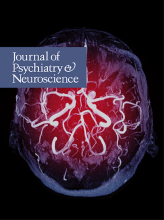A 70-year-old woman with a long history of mood disorder presented to her psychiatrist complaining of increasing confusion. She had a history of recurrent depression since her mid-thirties and had been on and off various antidepressant drugs. She felt they had not helped her, even though she had clearly improved on several of the medications, including venlafaxine. A couple of months earlier, she was feeling worse and was restarted on venlafaxine, 75 mg per day. After a couple of weeks, venlafaxine was increased to 150 mg per day. She reported that she had been feeling better since restarting venlafaxine: she rated her mood as 1 out of 10 (0 = worst, 10 = best) before she restarted the medication and 5 out of 10 since then. However, she felt confused. She could not pinpoint the onset of her confusion but thought it had started about 3 months earlier, when she felt severely depressed. She reported forgetting appointments, to the extent that her husband had to keep her schedule (she forgot to call her son for his birthday, missed turns on familiar roads and got lost in familiar neighbourhoods). Her venlafaxine was decreased to 75 mg a day, but her confusion persisted. The following week, she ran a red light and was involved in a motor vehicle accident. She was admitted to the hospital and, on admission, her serum sodium was found to be 128 mEq/L. Case-controlled and retrospective studies have reported an incidence of hyponatremia between 10% and 40% in older patients treated with serotonergic antidepressant drugs. In one study, 10 of 14 (71%) older patients taking venlafaxine were found to be hyponatremic (Kirby and others, Int J Geriatr Psychiatry 2002;17:231–7). In the only published prospective study (Fabian and others, Arch Intern Med 2004;164:327–32), 9 of 75 (12%) older patients developed hyponatremia within 1 to 14 days after initiation of paroxetine. This underestimates the incidence in clinical settings, because the study design included monitoring and prevention of hyponatremia. Risk factors for hyponatremia induced by serotonergic antidepressant drugs include older age, female sex, low weight, intake of diuretics and lower baseline sodium levels (Movig and others, Br J Clin Pharmacol 2002;53:363–9). Hyponatremia does not appear to be related to the dose or plasma level of the serotonergic antidepressant. It is caused by an inappropriate secretion of ADH, resulting from enhanced serotonergic tone, as experimentally demonstrated in rats. However, even in the presence of elevated ADH, hyponatremia will not occur unless fluid intake is also increased (e.g., when managing constipation or a urinary infection). Most clinicians do not realize how commonly serotonergic antidepressant drugs induce hyponatremia, because associated symptoms are nonspecific and are interpreted as either symptoms of depression (e.g., fatigue, anorexia, confusion) or medication side effects (e.g., fatigue, nausea). In the prospective study by Fabian and colleagues, only 1 of the 9 patients with hyponatremia became clearly symptomatic. In most patients, hyponatremia is mild and transient, but in some cases, if undetected, it can be persistent and progress to seizure, coma or death. Thus, it is prudent to check sodium levels at baseline and 1–2 weeks after initiating a serotonergic antidepressant in older patients with additional risk factors or who receive other medications associated with ADH secretion (e.g., thiazide diuretics, antipsychotic drugs, or nonsteroidal anti-inflammatory drugs). If mild hyponatremia develops, it can be managed with fluid restriction (i.e., 800–1000 mL per day) and close monitoring. In the absence of systematic screening, clinicians should maintain a high index of suspicion for hyponatremia and promptly check sodium if a patient becomes lethargic or confused.
Footnotes
The information in this column is not intended as a definitive treatment strategy but as a suggested approach for clinicians treating patients with similar histories. Individual cases may vary and should be evaluated carefully before treatment is provided.
Competing interests: Dr. Mulsant holds stock in Akzo-Nobel, Alkermes, Astra-Zeneca, Biogen Idec, Celsion, Elan, Eli Lilly, Forest, General Electric, Immune Response and Pfizer. Within the last 2 years, he has received grants, consultant fees or other financial support from the National Institutes of Health, AstraZeneca, Eli Lilly, Forest, Jansen, Pfizer, Fox Learning System and Lundbeck. Within the last 2 years, he has been a member of the speakers’ bureaus of AstraZeneca, Eisai, Forest and Pfizer.
Psychopharmacology for the Clinician columns are usually based on a case report that illustrates a point of interest in clinical psychopharmacology. They are about 500 words long, and references are not necessary.
Please submit appropriate columns online at http://mc.manuscriptcentral.com/jpn; inquiries may be directed to jpn{at}cma.ca.






